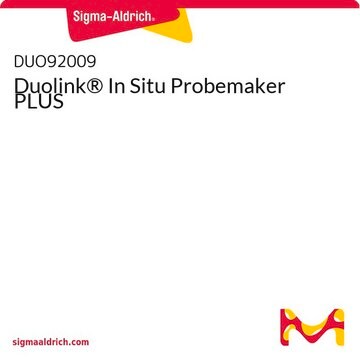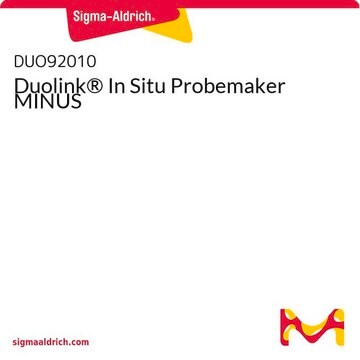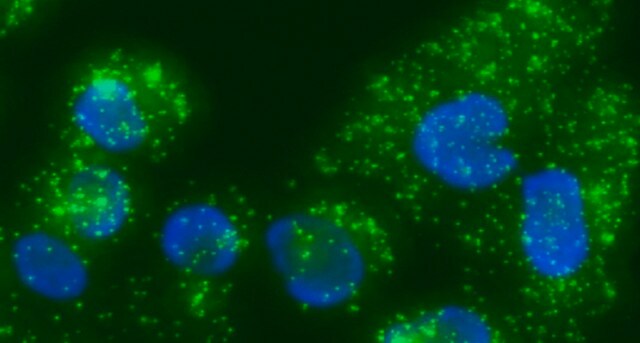DUO96040
Duolink® PLA Multicolor Probemaker Kit - Far Red
Proximity Ligation Assay Multiplexing: protein-protein interaction, post-translational modification and low abundant protein events
Synonyme(s) :
in situ Proximity Ligation Assay, Flowcytometry-PLA, Protein Protein Interaction Kit
About This Item
Produits recommandés
Technique(s)
immunofluorescence: suitable
multiplexing: suitable
proximity ligation assay: suitable
Fluorescence
λex 646 nm; λem 664 nm (Far Red)
λex 646 nm; λem 664 nm
Adéquation
suitable for fluorescence
Conditions d'expédition
dry ice
Température de stockage
−20°C
Application
Far Red fluorescence detection reagents are often used with Cy®5 filter.
Application Note
Primary antibodies are needed. Test your primary antibodies (IgG-class, mono- or polyclonal) in a standard immunofluorescence (IF), immunohistochemistry (IHC), or immunocytochemistry (ICC) assay to determine the optimal fixation, blocking, and titer conditions. Duolink® in situ reagents are suitable for use on fixed cells, cytospin cells, cells grown on slide, formalin-fixed, paraffin embedded (FFPE), or tissue (fresh or frozen). No minimum number of cells is required.
Let us do the work for you, learn more about our Custom Service Program to accelerate your Duolink® projects
View full Duolink® product list
Caractéristiques et avantages
- Detect multiple PPI, PTM and low abundant protein events in a single sample.
- Visualize protein complex formation and dissociation
- Monitor protein signaling pathways
- No overexpression or genetic manipulation required
- High specificity (fewer false positives)
- Detection of low abundant proteins due to rolling circle amplification
- Relative quantification possible
- No special equipment needed
- Faster and more simple than FRET
- Increased accuracy compared to co-IP
- Publication-ready results
Components
Duolink® PLA Multicolor Probemaker Kit - Far Red contains all the necessary reagents to perform the conjugations of Far Red Oligo H and Far Red Oligo I directly to primary antibodies. The resulting PLA probes (Far Red H and Far Red I) must be used together and cannot be paired with any other Duolink® PLA probe.
This product is comprised of the following:
- Far Red Oligo H DUO86040H
- Far Red Oligo I DUO86040I
- Conjugation Buffer DUO82033
- Stop Reagent DUO82034
- Storage Solution DUO82035
See datasheet for more information.
To perform a Multicolor Duolink® PLA experiment primary antibodies (PLA, IHC, ICC or IF validated) that recognize protein targets of interest are required. Duolink® PLA Multicolor Probemaker-generated probes (Red A/Red B, Green C/Green D, Orange F/Orange G, and/or FarRed H/FarRed I) are used in combination to perform the Multiplex experiment.The reagents in the Duolink® PLA Multicolor Reagent Pack are required to perform the amplification and detection of the resulting PLA probes. Required additional reagents include Duolink® Wash Buffers and Mounting Medium.
Informations légales
Mention d'avertissement
Warning
Mentions de danger
Conseils de prudence
Classification des risques
Aquatic Chronic 2 - Skin Sens. 1
Code de la classe de stockage
10 - Combustible liquids
Classe de danger pour l'eau (WGK)
WGK 3
Certificats d'analyse (COA)
Recherchez un Certificats d'analyse (COA) en saisissant le numéro de lot du produit. Les numéros de lot figurent sur l'étiquette du produit après les mots "Lot" ou "Batch".
Déjà en possession de ce produit ?
Retrouvez la documentation relative aux produits que vous avez récemment achetés dans la Bibliothèque de documents.
Les clients ont également consulté
Notre équipe de scientifiques dispose d'une expérience dans tous les secteurs de la recherche, notamment en sciences de la vie, science des matériaux, synthèse chimique, chromatographie, analyse et dans de nombreux autres domaines..
Contacter notre Service technique













